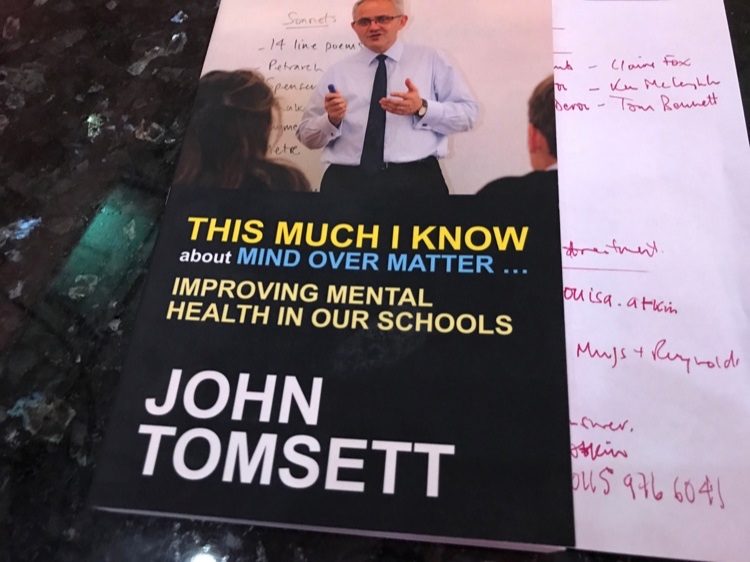Publicerat 11 maj 2017
The Sleep-Deprived Generation
Today, feeling the snow, wind and cold, it is hard to believe that spring in on its way to Sigtuna. It brings to mind the plaintiff voice of the Romantic poet Percy Shelley: “If Winter comes, can Spring be far behind?” Here winter has come and gone, but keeps coming back again and again. By the weekend, however we should have seen the last of night frost. Being optimists, we are hoping that our graduating students will get the best of the Swedish spring sunshine on May 24 to celebrate a glorious final day at SSHL.
I have just come back from attending the BSA (Boarding Schools’ Association) Heads Conference in York, UK. It’s truly inspiring to meet so many other schools that provide a first-class boarding experience for young people around the world. We come together to share ideas and experiences and, working together in a supportive environment, help to make boarding schools better.
One thing we all share as members of the BSA is a clear commitment to enriching the lives of the young people that come through our schools, providing each and every pupil the support and encouragement to develop and grow as individuals.
It was very clear to me that some of the top international boarding schools are not just admitting students from privileged homes to a first class education, some are now also cooperating with organisations like The Spring Board Bursary Foundation to provide opportunities for underprivileged young people from the inner cities. Pupils come from all walks of life and aren’t necessarily the brightest, but share a common desire to work hard and develop. This is an excellent initiative that is sure to increase social mobility.
Meeting the Challenge of Social Media
One of the main topics addressed at the conference was the concern amongst educationalists about the negative effect of social media on young people. Studies show that mental health issues are directly linked to the use of smart phones and social media channels.
Prof. Tanya Byron was invited to the conference to share her vast experience with working with mental health care and young people. Her keynote was one of the most informative and inspiring talks I listened to and gave me much to think about when it comes to the challenges facing young people.
Byron spoke at length about the so-called “sleep-deprived generation”: young people connected to net (and social media!) virtually 24/7. Byron spoke about studies that suggest it’s common for many young people to wake up in the middle of the night to reply to a text message, Snapchat or some other kind of notification from many of the other social media channels. Others sit up late into the night online gaming, for example, with friends all over the world in different time zones.
Tanya Byron is very clear that sleep deprivation and access to social media channels without some form of supervision and support has a very negative effect on young people. Clinicians are seeing a drastic increase in mental health issues which they link directly to the use of smartphones and the internet.
It is clear to me that we as adults must take responsibility in ensuring young people are better equipped to handle this situation. We need to be aware how our children are using social media. We need to ensure that they are getting undisturbed sleep so they are ready to tackle the challenges of daily life. Sleep is important to their well-being.
Furthermore, we also need to be careful that our young people are not being negatively affected by social media in other ways. There is considerable peer pressure and educationalists are clearly concerned that young people’s mental health is jeopardised by some of the attitudes and behaviours we see online.
I don’t have all the answers to this but, like many colleagues working in educational management across the world, I am determined that at SSHL we address how the internet and social media in particular are impacting the lives of our pupils. I encourage you as parents to discuss social media usage with your children. Get more insight into how they are using it. Hopefully, we can help provide a secure and safe platform together for our young people to get the most out of digital communications without suffering any negative effects.
University of Cambridge at SSHL
Many thanks to Richard Partington and Caroline Burt from the University of Cambridge for once again visiting SSHL to talk about studying at Cambridge. Gradängsalen was packed with students who came along to listen and learn more. Quite a few of them took the chance to talk with Richard and Caroline in Café Humlan afterwards. Fantastic!
STUD 17
It’s not long now until this year’s Studenten. Once change that you might notice next time you visit the school is that we’ve recently installed an iron fence on the wall where students traditionally stand and celebrate after running out. This hasn’t been done to curb traditions. It’s still possible to stand there! However, there is now a safety rail to hold onto!
Dr Margret Benedikz
Director, SSHL
NB: This post is only available in English

